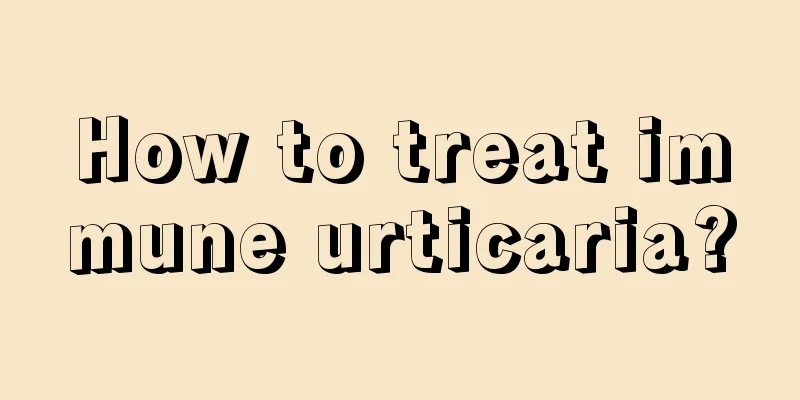How to treat immune urticaria?

|
Urticaria is a common skin disease in daily life, and there are many reasons for urticaria. Generally speaking, urticaria is easily caused by skin allergies to certain plants or skin damage. Immune urticaria is not common in life. It is a skin disease of the body's immune function. It can be treated by taking medication or using some topical creams. treat General treatment Because the causes of urticaria vary, the treatment effects are also different. The specific treatment measures are as follows: (1) Eliminate the cause. Every patient should strive to find the cause of the attack and avoid it. If the cause is infection, the infected lesions should be treated actively. If the allergy is caused by drugs, the allergy medication should be stopped; if the allergy is caused by food, find out the allergic food and stop eating this food. (2) Avoid triggering factors. For example, for cold urticaria, you should keep warm; for acetylcholine urticaria, you should reduce exercise, sweating and mood swings; for contact urticaria, you should reduce the chance of contact. Drug treatment (1) Antihistamines ①H receptor antagonists have strong anti-histamine and anti-other inflammatory mediator effects and are effective in treating various types of urticaria. (2) Drugs that inhibit mast cell degranulation and reduce histamine release ① Meta-hydroxyisobutyrine sulfate is a β2 adrenergic receptor stimulator that can increase the concentration of cAMP in the body, thereby inhibiting mast cell degranulation. ② Ketotifen inhibits mast cell degranulation and prevents the release of inflammatory mediators (such as histamine, slow-reacting substances, etc.) by increasing the concentration of cAMP in the body. Its suppressed. It is stronger and faster than sodium cromoglycate and can be taken orally. ③Sodium cromoglycate can block the binding of antigen and antibody and inhibit the release of inflammatory mediators. If used in combination with glucocorticoids, the dosage of the latter can be reduced and the therapeutic effect can be enhanced. ④ Tranilast reduces the release of histamine by stabilizing the mast cell membrane. (3) Glucocorticoids It is a second-line drug for the treatment of urticaria. It is generally used when severe acute urticaria, urticarial vasculitis, pressure urticaria are ineffective with antihistamines, or when chronic urticaria is severely stimulated. It is given by intravenous drip or orally, and long-term use should be avoided. Commonly used drugs are as follows: ① prednisone; ② triamcinolone; ③ dexamethasone; ④ diprosone. In emergency situations, hydrocortisone, dexamethasone, or methylprednisolone is given intravenously. Immunosuppressants When patients with chronic urticaria have an autoimmune basis, the disease recurs, and the above treatments cannot achieve satisfactory results, immunosuppressants can be used. Cyclosporine has a good therapeutic effect. Azathioprine, cyclophosphamide, methotrexate and immunoglobulin can all be tried. Tripterygium wilfordii also has a certain therapeutic effect. Due to the high incidence of side effects of immunosuppressants, they are generally not recommended for the treatment of urticaria. In addition, drugs that reduce vascular permeability, such as vitamin C, vitamin P, calcium supplements, etc., are often used in combination with antihistamines. If it is caused by infectious factors, appropriate antibiotics can be used for treatment. |
<<: What are the functions and effects of tocopherol
>>: The specific effects of cooking peanuts and red dates
Recommend
How to cook fish to nourish the stomach?
The stomach-nourishing effect of fish is quite ob...
What are the effects and functions of silkworm sand pillow
Pillows are essential bedding for our daily sleep...
Symptoms of menopause and Alzheimer's disease syndrome
Alzheimer's disease is actually a primary deg...
What are the benefits of tapping the inside of your arms?
With the continuous improvement of daily living s...
What to do if your hair is dry and frizzy
Dry and frizzy hair is actually a common problem,...
Are there risks in prostate cancer biopsy
Prostate cancer is a common disease in elderly me...
Feeling emotionally unstable during early pregnancy?
A woman's mood during pregnancy is very impor...
What to do if you have toothache and swollen gums? Here are eight tips to help you
Toothache and swollen gums may be caused by infla...
Is it normal for the fetal heart rate to be between 170 and 180?
A fetal heart rate of 170 to 180 is abnormal. Nor...
Common nursing diagnoses for lung cancer?
Lung cancer patients will have impaired gas excha...
Several common diagnostic methods for esophageal cancer
Before treating esophageal cancer, it is necessar...
What is the reason for sweaty armpits and sour smell when touching the hands
Many people will find that their armpits sweat a ...
Lustful men are more susceptible to prostate cancer. What is the cause of prostate cancer?
Prostate cancer threatens not only the safety of ...
What should I do about cervical precancerous lesions? What are the symptoms of cervical precancerous lesions?
Cervical cancer is a malignant tumor that serious...
Is gallbladder cancer still contagious after death?
Gallbladder cancer is a new type of malignant tum...









